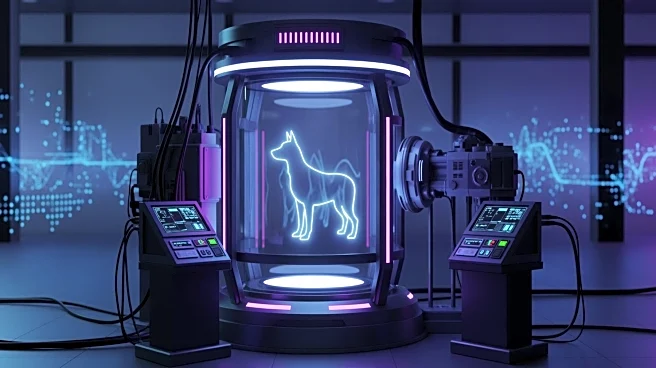What's Happening?
Retired NFL star Tom Brady has revealed that his dog Junie is a clone of his late dog Lua. This development was made possible through the biotechnology and genetic engineering company Colossal Biosciences,
where Brady is an investor. The cloning was achieved using a non-invasive blood draw from Lua before she passed away in December 2023. Colossal Biosciences recently acquired Viagen Pets and Equine, a leader in animal cloning, which has successfully cloned 15 species, including endangered ones. Brady expressed his excitement about the potential of this technology to help families with pet loss and contribute to the conservation of endangered species.
Why It's Important?
The cloning of Brady's dog underscores significant advancements in biotechnology and genetic engineering, particularly in the field of animal cloning. This technology offers a unique solution for pet owners grieving the loss of their animals, providing a way to preserve a part of their beloved pets. Additionally, the acquisition of Viagen by Colossal Biosciences highlights the growing interest and investment in cloning technologies, which could have broader implications for biodiversity conservation. By potentially aiding in the preservation of endangered species, this technology could play a crucial role in ecological conservation efforts.
What's Next?
As Colossal Biosciences and Viagen continue to develop and refine their cloning technologies, there may be increased interest from both pet owners and conservationists. The collaboration between these companies could lead to further innovations in cloning techniques, potentially expanding their applications beyond pets to include more endangered species. Stakeholders in the biotechnology and conservation sectors will likely monitor these developments closely, assessing the ethical and ecological implications of widespread cloning practices.
Beyond the Headlines
The ethical considerations surrounding animal cloning remain a topic of debate. While the technology offers potential benefits, such as aiding in species conservation and providing comfort to pet owners, it also raises questions about the implications of cloning on animal welfare and biodiversity. As cloning becomes more prevalent, discussions around the regulation and ethical use of this technology are expected to intensify, potentially influencing public policy and scientific research priorities.











